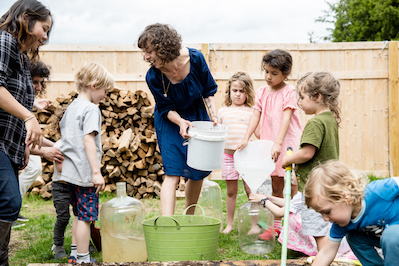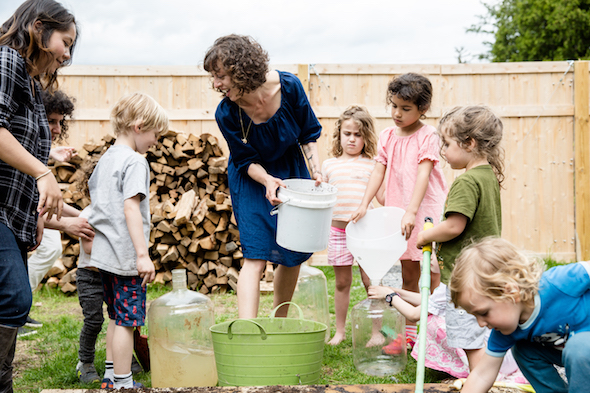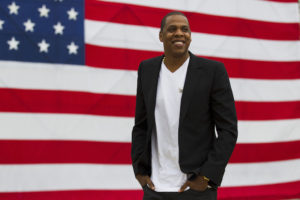Redefining ‘Success’ in the Age of Donald Trump
American culture is obsessed with celebrity, money and excess at the expense of ourselves and those around us. What if we defined success in terms of Gross National Happiness?

Author Lauren Maples at work. (Bija)
The following is an edited version of a talk the author gave to an audience of neighbors at a “PechaKucha Night” in Beacon, N.Y. on June 12. PechaKucha is a presentation franchise developed in Tokyo with events in more than 900 cities worldwide.
I don’t know about you, but I grew up with a very narrow definition of what it means to be successful. Those early understandings shaped me and beliefs today.
In the early 1980s there was excess all around. Even if you weren’t experiencing it personally, you were probably exposed to it. Success in my household and my community was about doing whatever it took to acquire money, power and status.
I spent my childhood watching my father work endless hours simply to buy stuff. He worked a job he hated. It stressed him out and kept him travelling four to five nights per week. I don’t recall a debate about whether or not this was a good way to live, but I do remember the words “security,” “status” and “money” being regular parts of the conversation.
My own early life experiences weren’t totally different. I was a serious ballet student from a very early age and at 13 left home to study ballet at the Harid Conservatory [in Boca Raton, Fla.], a highly competitive boarding school for dancers. Harid only accepted 30 students a year. The stakes were high and life was totally about “making it.” During all my years studying ballet, there was never a conversation about the cost of training to my body, to my mental health, to my social experiences or even my future adult life. Pushing myself wasn’t negotiable; I was on a path to become a successful dancer.
I don’t think our broad cultural definition of success has changed much since the time of my childhood. We don’t have to go much farther than Donald Trump and his mirror to understand that as a society we are obsessed with celebrity, money and excess while we ignore the cost to ourselves and those around us. I will never forget seeing New Dehli on my first visit to India. Literally adjacent to the slums, great, glittering glass towers rise. Even in India, the spiritual capital of the world (in my humble opinion) these towers now mark the importance of money first, life second. Me first, humanity second.
Back at home I’ve watched my friends enter professional fields that reward employees for working insane hours and pulling all-nighters; lawyers, architects and doctors who spend years stuck staring at screens on Saturdays and Sundays. “Getting ahead” requires it now. We teach our children that the way to live is to work, work, work — for stuff. We glamorize busy-ness and today even our youngest children are subjected to hours of meaningless work each night after a long day of school. What happened to running around outside, getting into trouble with your friends and good old-fashioned play? For most kids, it seems, it’s pretty much gone.
I bring all this up not because it’s depressing (which it is) but because over the past several years I’ve continually asked: What if we redefined success to be about purpose and contentment? What if like the Bhutanese people we measured our success based on “Gross National Happiness” rather than “Gross Domestic Product”? If you are fortunate enough not to spend your days worrying about your basic needs, then you have a chance to make this happen.
For me, getting to this place has been a long journey, and professionally it’s gone like this: After spending my early years in pointe shoes, I had a realization at age 17: This career is not going to make me happy; it’s not going to take me to the places in life I want to go. I wanted a life fueled by passion, experiences and purpose.
I realized that the best way to redefine success is not to have to redefine it at all. In 2005 I opened the doors of Bija. Today Bija is a thriving, socially conscious preschool with locations in Brooklyn and Beacon, N.Y. At Bija we teach kids that hard work has a purpose but it isn’t everything. Life is also about joy, laughter and connecting. We teach our students that creativity and being your true self matters more than fitting into someone else’s predefined box. We encourage our teachers to travel, eat delicious food and pursue their own dreams and passions. The best way to learn is from those around you, and our teachers spend countless hours with our students. This is what we see as the model for success in the next generation.
How do we get there? Here are some of my thoughts:
It’s important to take time to be creative. I do that through cooking. This gives me space to think, breathe and connect. Instead of being stuck in a hamster wheel of emails, I’m creating. Amazingly, by chilling out, I actually get more done.
I’m also a big fan of self-care. Every morning I head to a riverside park with my dogs, even when it’s gross out. It’s easy to get sucked into feeling guilty for taking care of yourself; our culture tells us we are only successful if we’re stressed out. But self-care is both important for quality of life and professional success.
I’ve also managed to create a community of people who pull me out of the “success mindset” and help me focus on the things that matter most to me, things that bring me a sense of purpose. Networks open us up to opportunities to do work that we find meaningful and fulfilling.
Redefining success requires connecting to our wants and desires and jumping in headfirst. To me, this type of risk taking is scary, but it’s also the only way to get there. I’ve always loved the statement, “There’s nothing between fear and fearlessness.” It’s something I remind myself every time I hesitate to get closer to what I regard as my true self and ideas. Even when we fall, we can get closer to the things that make life worth living.
Instead of measuring success by the amount of money we have or the number of things we own, let us measure it in the joy, contentment and purpose we feel. My definition of success and yours will never be identical. We aren’t cogs in a wheel; we’re thinking, breathing, feeling beings. This is what I want to teach my students. This is the way I try to live my life each day. I hope my saying so brings you a little closer to doing the same.
Lauren Maples is the founder and director of Bija, a preschool with locations in Brooklyn and Beacon, N.Y.
Your support matters…Independent journalism is under threat and overshadowed by heavily funded mainstream media.
You can help level the playing field. Become a member.
Your tax-deductible contribution keeps us digging beneath the headlines to give you thought-provoking, investigative reporting and analysis that unearths what's really happening- without compromise.
Give today to support our courageous, independent journalists.




You need to be a supporter to comment.
There are currently no responses to this article.
Be the first to respond.